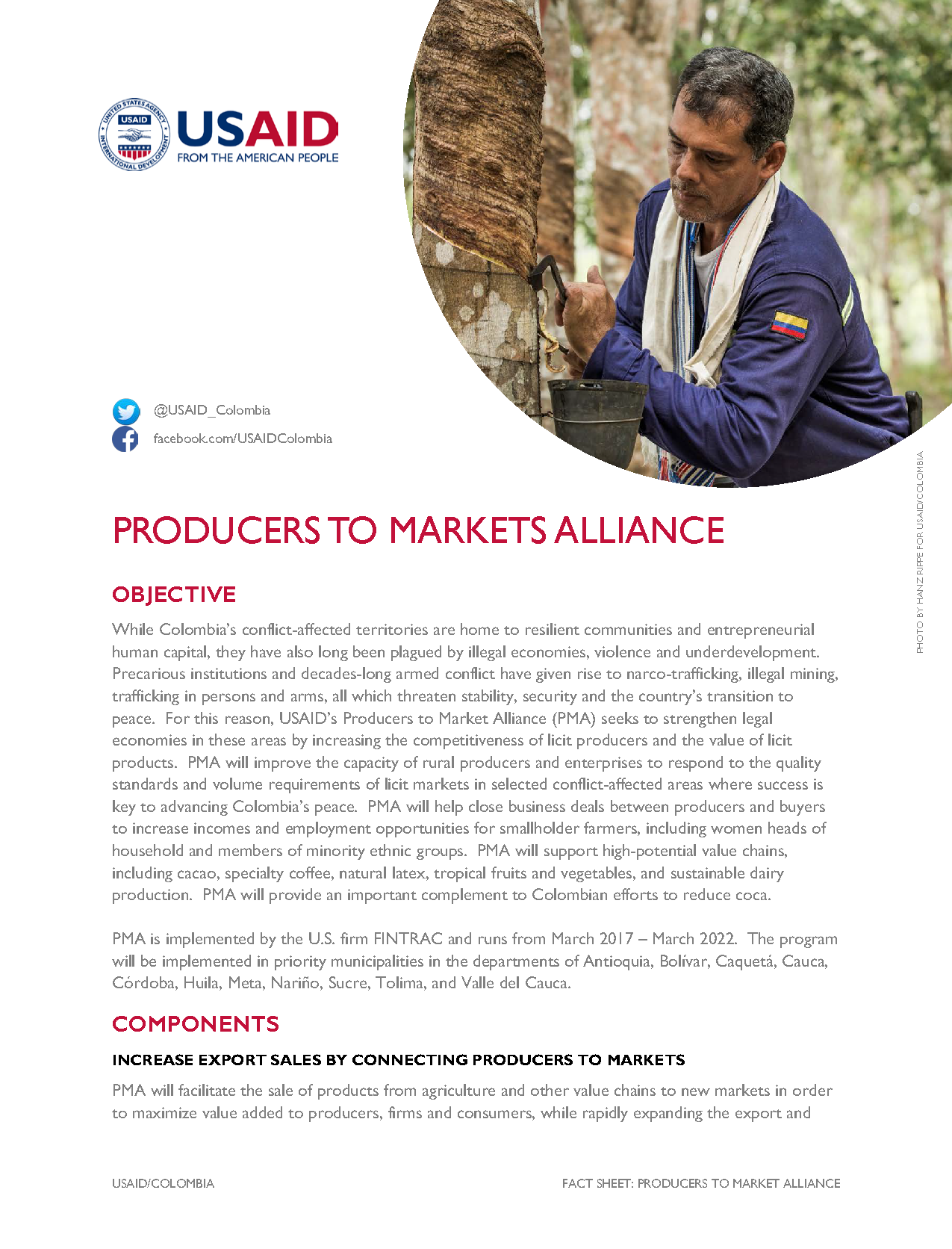Producers to Markets Alliance ![]() (pdf - 231k)
(pdf - 231k)
OBJECTIVE
While Colombia’s conflict-affected territories are home to resilient communities and entrepreneurial human capital, they have also long been plagued by illegal economies, violence and underdevelopment. Precarious institutions and decades-long armed conflict have given rise to narco-trafficking, illegal mining, trafficking in persons and arms, all which threaten stability, security and the country’s transition to peace. For this reason, USAID’s Producers to Market Alliance (PMA) seeks to strengthen legal economies in these areas by increasing the competitiveness of licit producers and the value of licit products. PMA will improve the capacity of rural producers and enterprises to respond to the quality standards and volume requirements of licit markets in selected conflict-affected areas where success is key to advancing Colombia’s peace. PMA will help close business deals between producers and buyers to increase incomes and employment opportunities for smallholder farmers, including women heads of household and members of minority ethnic groups. PMA will support high-potential value chains, including cacao, specialty coffee, natural latex, tropical fruits and vegetables, and sustainable dairy production. PMA will provide an important complement to Colombian efforts to reduce coca.
PMA is implemented by the U.S. firm FINTRAC and runs from March 2017 – March 2022. The program will be implemented in priority municipalities in the departments of Antioquia, Bolívar, Caquetá, Cauca, Córdoba, Huila, Meta, Nariño, Sucre, Tolima, and Valle del Cauca.
COMPONENTS
Increase export sales by connecting producers to markets
PMA will facilitate the sale of products from agriculture and other value chains to new markets in order to maximize value added to producers, firms and consumers, while rapidly expanding the export and trade opportunities for rural producers and businesses. The program will ensure the financial, technical and managerial sustainability of targeted producers by linking them to buyers and providing assistance in closing business deals that meet market requirements. PMA will increase market access and help producers meet the requirements for product quality, timeliness, price, and adherence to sanitary and phytosanitary standards. PMA will enable producers to better connect to agriculture and other export opportunities.
Increase production that responds to market demand
Five value chains - cacao, specialty coffee, natural latex, tropical fruits and vegetables, and sustainable dairy production - have considerable untapped potential for growth. PMA will support new plantings, crop renewal, increased productivity, improved post-harvest handling, and other value adding efforts. PMA will reduce production costs, increase yields, improve product quality, develop handling and delivery schedules for selling, and improve customer fulfillment. PMA will help producers organize in order to offer better quality products at competitive market prices and greater volumes. PMA will assist farmers exiting coca for licit crops.
Increase investment in rural infrastructure
PMA will leverage and mobilize financial resources to facilitate public and private investments in rural infrastructure that support the key value chains and business deals targeted under PMA. The interventions will address infrastructure bottlenecks to successfully execute the business deals reached in PMA’s first two components. PMA will develop assessments, feasibility and technical studies, environmental analyses, and engineering and architectural designs to support productive infrastructure investment. This will include support to help communities organize to repair and maintain tertiary roads and other infrastructure requirements throughout the program’s geography.
RESULTS
By the end of PMA, expected results include the following:
- Increased total value of exports by 300 - 500% of targeted value chains.
- Increased producer sales by 250 - 300% through production improvements.
- Produce at least $130 million in transaction sales.
- Leverage at least $50 million of public/private funds for infrastructure investments to facilitate sales of key value chain products.








Comment
Make a general inquiry or suggest an improvement.